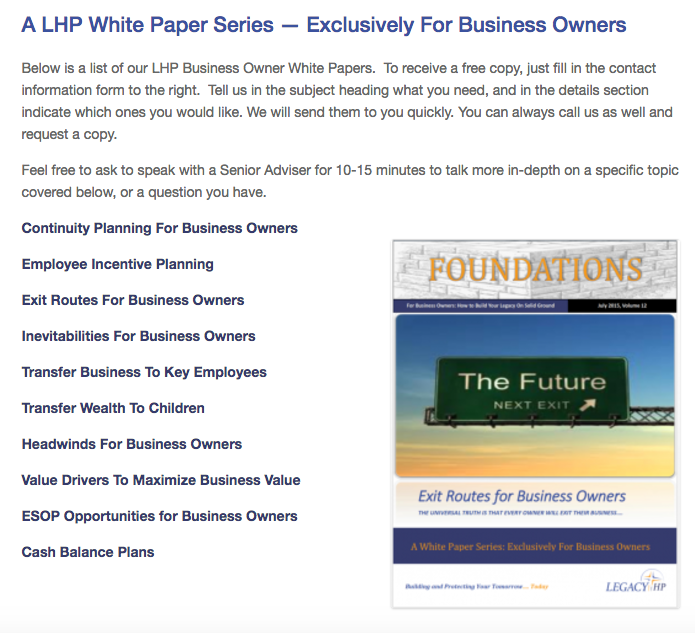For business owners, paying non-essential professional fees is nearly as unpalatable as paying unnecessary taxes. If you are convinced that you don’t require the services of a certified valuation analyst to value your company, this will not be your favorite issue of this newsletter. This issue (and an open mind) may, however, help you avoid an unpleasant encounter with the IRS and help you to reap all of the value of your life’s work.
Let’s look at six reasons why smart owners secure independent business valuations.
Reason One
As you know, Exit Planning is a seven-step process that is completely focused on each owner’s unique objectives. A major objective shared by many is to receive the full, fair value for their ownership interest. When discussing the value of their lives’ work, most owners are not comfortable with rules of thumb, informal or casual estimates. How do you know the true value of your business unless an experienced, trained business valuation specialist values it?
Ask yourself this question: If you were to transfer ownership to a sophisticated outside buyer, would that buyer acquire your business without first determining its worth? Of course not—nor should you sell it to anyone without first determining its worth.
Reason Two
When thinking about your exit, one of the first questions you must ask and answer is, "How much will I need from the sale of my company to maintain the lifestyle I want for me (and for my family) in retirement?" The next question should be, "Is my business worth enough (on an after-tax basis) to support those needs? You must know this answer before you proceed down any exit path.
Reason Three
It surprises many owners to learn that business value is relative, not fixed. It can vary, in part, based on the reason for transferring ownership and on the conditions under which a transfer is made. For example, an appropriate business value for a third party sale may be significantly higher than that established for a transfer of the same business to key employees over time, or a gift of the business to children. Business valuation experts understand this, "rules of thumb" don’t.
Reason Four
An important part of the Exit Planning Process™ (Step Three) is growing the value of the business. Whether you contemplate a transfer to insiders or a sale to outsiders, it is important to motivate and keep management/key employees. Incentive programs that both motivate and "handcuff" employees to a company are based on formulas. The most successful of these incentive programs (whether cash- or stock-based) use formulas that include linking the size of a bonus to growth in business value. Participating employees will be most interested to know how you established an accurate business value and whether that value is fair to them. Relying on an outside appraiser is often the best way to dispel these concerns.
Reason Five
If you are considering a transfer to key employees, do you believe that they will accept a "rule of thumb" valuation? Bear in mind, they likely have little sense for what the business value is, or how it should be determined. Even though you may (for tax and other reasons) decide to sell the business at a low value, employees may not consider the value to be low. It is best to anticipate these concerns and to obtain an independent valuation.
Reason Six
In a transfer to key employees, a common transfer technique (designed to reduce both owner’s and buyer’s tax liabilities) is to initially transfer a minority interest at a discounted value. Using a "rule of thumb" valuation to support a minority discount simply will not fly when the IRS asks you to justify the discount. You must depend on the valuation of an independent valuation specialist who is able and willing to defend her valuation before the IRS.
The transfer of your ownership interest is the final act in your business career. Doesn’t it make sense to maximize the value of your life’s work?
If the cost of a valuation seems "unnecessary," compare it to the cost of underestimating your company’s value (thus leaving money on the table), or of defending a rule of thumb value before the IRS—unprotected by a proper valuation.
Take care and have a good day,
Michael
ABOUT LEGACYHP: Our passion is our mission -- To position our clients into a positive, energized, posture -- within your businesses and within your lives -- So that you manage change confidently, take decisive action, and enjoy life's journey Today... while you enjoy building your Legacy for Tomorrow.
Notice: The information contained in this article is general in nature and is not legal, tax or financial advice. For information regarding your particular situation, contact an attorney or a tax or financial advisor. The information in this newsletter is provided with the understanding that it does not render legal, accounting, tax or financial advice. In specific cases, clients should consult their legal, accounting, tax or financial advisor. This article is not intended to give advice or to represent our firm as being qualified to give advice in all areas of professional services. Exit Planning is a discipline that typically requires the collaboration of multiple professional advisors. To the extent that our firm does not have the expertise required on a particular matter, we will always work closely with you to help you gain access to the resources and professional advice that you need.


